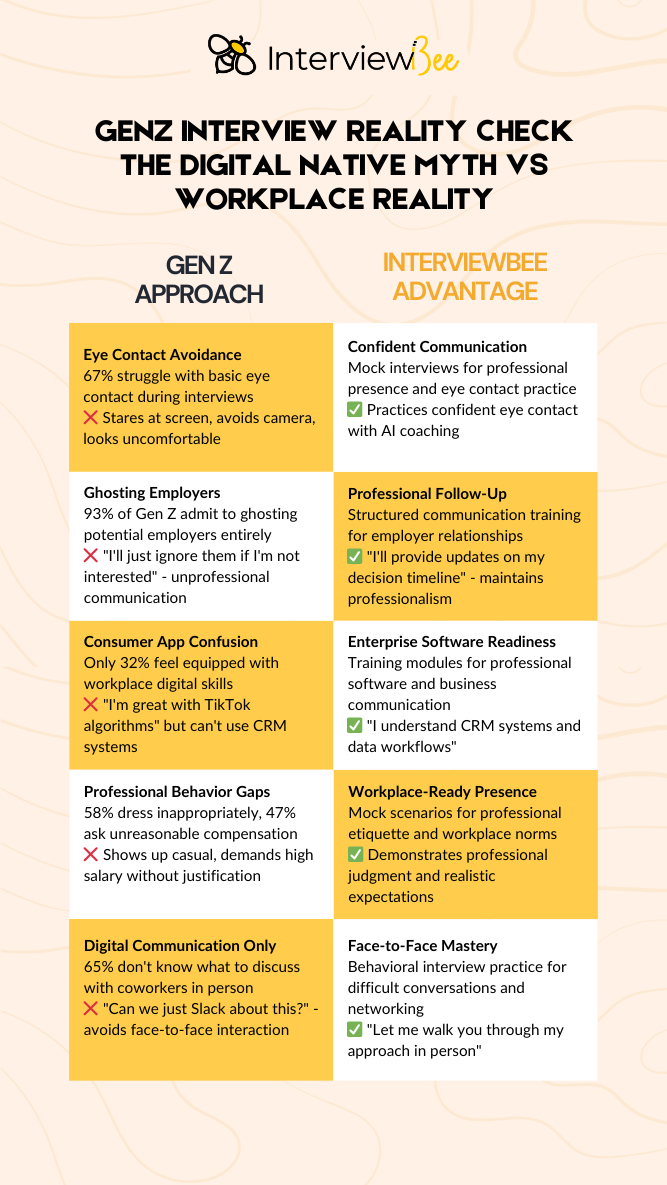
Working with Gen Z: 25 Questions Expose Digital Myths
- Author: Anindita Ghosh
- Published On: Sep 14,2025
- Category:Interview Guide
The conventional wisdom about working with Gen Z has been completely shattered. Despite being labeled "digital natives," groundbreaking 2025 research reveals that Generation Z candidates are struggling with fundamental workplace skills that employers expected them to master. While 50% of employers report that Gen Z struggles with basic eye contact during interviews, the reality runs much deeper, exposing a comprehensive skills gap that challenges everything we thought we knew about working with Gen Z professionals.
The Digital Native Myth: What 2025 Data Actually Reveals
Recent survey data paints a stark picture that contradicts popular assumptions about working with Gen Z. A staggering 67% of recruiters report that Gen Z candidates have difficulty making eye contact during job interviews, while 93% of Gen Z workers admit to ghosting potential employers entirely. Perhaps most surprising, only 32% of Gen Z feels adequately equipped with the digital skills needed for workplace success, a shocking statistic for a generation assumed to be technology experts.
The Eye Contact Crisis in Modern Interviews
The most visible manifestation of challenges when working with Gen Z centers on basic interpersonal skills. Research from Salarship involving 43 recruiters found that 29 of them agreed Gen Z candidates struggle with this fundamental aspect of professional communication. This challenge stems from what experts call the "digital-first upbringing effect", having grown up communicating primarily through screens, many Gen Z individuals find face-to-face interactions less natural.
The Professional Behavior Gap
Survey data from Resume Builder involving 782 hiring managers reveals the scope of professional behavior issues affecting working with Gen Z candidates:
- 58% weren't dressed appropriately for interviews
- 57% struggled with eye contact
- 47% asked for unreasonable compensation
- 19% used inappropriate language
- 13% refused to turn on their camera during virtual interviews
These statistics represent more than isolated incidents, they reflect systemic gaps in professional preparation that contradict the "digitally sophisticated" stereotype.
The 25 Gen Z Interview Questions That Expose Reality
Based on comprehensive 2025 research, the following advanced interview questions have proven most effective at revealing the gap between Gen Z's digital reputation and workplace reality:
Digital Skills Reality Check (Questions 1-6)
1. "Walk me through troubleshooting a network connectivity issue across multiple devices without using online forums or tutorials."
This immediately distinguishes between genuine technical problem-solving ability and search engine dependency, crucial for working with Gen Z effectively.
2. "How would you transfer your contact list from one email platform to another while keeping all the information organized?"
This exposes the critical gap between consumer app fluency and basic enterprise software knowledge essential for working with Gen Z in professional environments.
3. "How would you architect a digital workflow for a cross-departmental project involving multiple stakeholders?"
This tests strategic thinking and enterprise-level digital planning beyond personal productivity apps.
4. "What steps would you take to protect confidential company information when sharing files with your team?"
Tests understanding of professional cybersecurity protocols versus personal data handling.
5. "Describe how you would conduct a digital audit of existing business processes to identify inefficiencies."
Evaluates analytical thinking and business process optimization skills.
6. "Describe how you would help a team member who's struggling to use new software that replaced their old system."
Tests understanding of technology adoption and change management in professional environments.
Advanced Communication & Soft Skills Assessment (Questions 7-12)
7. "Describe how you would handle a heated disagreement during a board presentation when technology fails."
Given that 65% of Gen Z struggle with face-to-face interactions, this tests crisis communication without digital crutches.
8. "Tell me about managing a project where team members across different time zones had conflicting communication preferences."
This reveals advanced coordination abilities and cross-cultural professional communication.
9. "How would you deliver negative feedback to a senior colleague who's resistant to digital transformation?"
Tests diplomatic communication and change management skills.
10. "Describe navigating a situation where you had to build trust with skeptical stakeholders who question your age/experience."
Addresses generational workplace dynamics and professional credibility building.
11. "How would you facilitate a brainstorming session with executives who prefer traditional methods over digital collaboration tools?"
Tests adaptability and respect for different work styles.
12. "Explain how you would mentor an older colleague struggling with new digital processes."
Evaluates reverse mentoring abilities and empathetic leadership.
Enterprise Problem-Solving Without AI (Questions 13-18)
13. "Describe developing a comprehensive business strategy when market research tools and AI assistance are unavailable."
This tests independent strategic thinking abilities without digital assistance, addressing the 72% AI dependency rate.
14. "How would you conduct competitive analysis using only primary research methods and direct observation?"
Reveals analytical capabilities beyond automated tools and algorithms.
15. "How would you estimate costs for a team event without using online calculators or budgeting apps?"
Tests fundamental business math and logical reasoning skills.
16. "Describe how you would prioritize multiple urgent client requests during a system outage affecting all digital tools."
Evaluates crisis management and decision-making under pressure.
17. "How would you compare prices for office supplies from different vendors without using price comparison websites?"
Tests negotiation skills and independent market assessment abilities.
18. "Explain your approach to conducting employee performance evaluations without HR software or digital templates."
Assesses human resource management and interpersonal evaluation skills.
Professional Workplace Readiness (Questions 19-25)
19. "How would you introduce yourself and connect with new people at a work networking event?"
This reveals networking abilities without digital mediation, addressing documented face-to-face interaction challenges.
20. "How would you handle discovering a significant error in a report after it's been distributed to C-level executives?"
Tests accountability, crisis management, and professional integrity.
21. "Explain your approach to managing up when your supervisor has different communication preferences and expectations."
Evaluates workplace hierarchy navigation and adaptability.
22. "Describe handling a situation where company values conflict with your personal beliefs about digital privacy."
Tests ethical reasoning and professional boundary management.
23. "How would you help your team adjust when the company changes from working from home to working in the office?"
Assesses change management and leadership during organizational shifts.
24. "Walk me through presenting quarterly results to investors who prefer traditional financial analysis over digital dashboards."
Tests presentation skills and ability to adapt communication style to audience preferences.
25. "Describe your approach to maintaining work-life boundaries when managing global teams across multiple time zones."
Evaluates professional sustainability and boundary management in a hyperconnected world.
The Skills Gap Behind Gen Z Communication Skills Interview Reality Check
Research consistently shows that 70% of business leaders highlight poor communication skills as Gen Z's primary weakness when working with Gen Z professionals. This gap stems from several converging factors:
Digital-First Upbringing Impact: Growing up with brief, informal digital communications has limited exposure to nuanced face-to-face interactions required for successful working with Gen Z integration.
Enterprise Technology Gap: Despite the "digital native" label, only 32% of Gen Z feels equipped with resources to learn digital skills needed for workplace success. The skills gap is particularly pronounced:
- Only 20% consider themselves skilled in coding
- Just 18% feel confident in data encryption and cybersecurity
- A mere 7% report AI competency
The Solution: Tailored Interview Preparation for Gen Z
The documented challenges reveal that working with Gen Z requires a fundamental shift in preparation and assessment approaches. Progressive organizations are adapting their strategies to address these unique needs.
How InterviewBee Addresses Gen Z Interview Challenges
InterviewBee's AI-powered platform specifically addresses the documented challenges of working with Gen Z by providing:
Real-Time Communication Support: Advanced AI assistance helps Gen Z candidates practice eye contact and professional communication during mock interviews, directly addressing the 67% who struggle with this skill.
Enterprise Software Simulation: The platform includes training modules for professional software and business communication, bridging the gap between consumer app fluency and workplace technology skills.
Behavioral Interview Practice: Structured scenarios help candidates practice difficult conversations and conflict resolution, essential skills for working with Gen Z in professional environments.

Looking Forward: The Future of Gen Z Integration
By 2025, Gen Z will comprise 27% of the global workforce, making successful working with Gen Z strategies essential for organizational success. The research reveals that successful integration requires understanding rather than judgment.
Companies reporting success with working with Gen Z emphasize clear expectations, structured feedback, purpose integration, and flexible professional development approaches.
The 25 interview questions outlined provide employers with concrete tools for assessing actual capabilities rather than assumed competencies. More importantly, they reveal opportunities for targeted skill development and organizational adaptation.
Rather than viewing Gen Z's challenges as insurmountable problems, successful organizations are recognizing them as adaptation opportunities. With proper support and development through platforms like InterviewBee, the generation struggling with eye contact today can become tomorrow's leaders.
Ready to bridge the Gen Z interview gap? Try InterviewBee's mock interview platform and experience tailored preparation for generational interview expectations.


